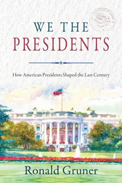
 |
Gruner's book gives readers a balanced history of the American presidents ranging from Warren Harding to Donald Trump. The author never uses the words Democrat or Republican. Instead of party politics, there are thorough explanations of policies and the reasons behind them. Another effect of taking out the partisan slant is that readers see the human beings, the presidents' characters, values, and work ethics. Readers receive a refreshing view of the ways presidents help Americans explore their own consciences.
Seventeen presidents are featured here, one per chapter. The defining challenges the leaders faced and their popularity when they left office are seen in the light of history. There is also a discussion of where the "America First" slogan came from and how it has been used, abused, misappropriated, or misunderstood. The chapters are divided under subheadings such as "Was Eisenhower's America Great?" and "Get the Government Off My Back!" Other perhaps less evocative but still thought-provoking ones include "Restoring the Economy" and "The Forgotten Invasion," to name a few. The epilogue discusses the January 6, 2021, insurrection at the nation's capital. The author presents even-minded, readable accounts of legislation presidents vetoed or did not veto. Plus, there are engaging human interest facts. For example, after his son died, Calvin Coolidge lost interest in being president and didn't run again. Herbert Hoover was despised and held responsible for the Great Depression, yet he is also credited for creating the American ideal of rugged individualism. There are clear explanations of economic theories and thorough descriptions of the struggles different presidents faced regarding immigration.
The book gives a deeper understanding of the divisions that every president faced. For instance, Franklin Roosevelt spoke to the fearful unemployed and the American elite who "denied government any role in alleviating human suffering." Each presidential story insightfully reveals why and how the United States has become so clearly divided along red and blue lines. Gaining this perspective gives the reader knowledge that makes it possible to judge a president not based solely on party divisions.
Witnessing the opposition Herbert Hoover expressed to Roosevelt's New Deal supports acknowledging that White House drama is different from voter concerns. While the book gives plenty of thorough details about the economic dimension of governing, it reveals presidents who are less attentive to education or social welfare, making a reader see how low priority these issues often receive from the elite offices in Washington. Yet, no matter who the leader was, the more that individual provided for the welfare of the common man and the downtrodden, the more beloved he was when leaving office. Those leaders who fought tooth and nail to keep the government out of business, or those who wanted to spend on lavish warfare for no plausible reason, left office in low esteem.
The reader also gets an intriguing and broad view of the historical evolution of core economic issues. For example, one can view the 2008 economic crisis in view of today's current lack of affordable housing. This vital historical knowledge can ultimately shape a more informed voter. Gruner's book should be seen as essential reading for every conscientious citizen and can help Americans prepare good questions about taxes, housing, health care, education, defense, equal rights, and immigration.
RECOMMENDED by the US Review